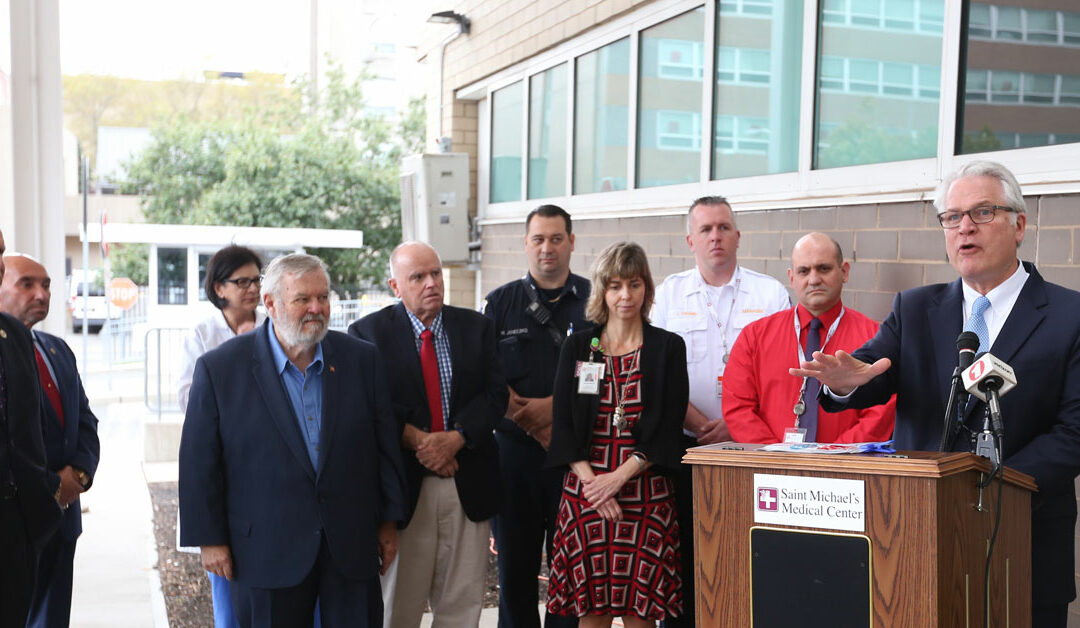Saint Michael’s CEO Robert Iannaccone discusses the Vial of Life at a press conference outside the hospital’s Emergency Department.
Working in partnership with public safety departments and first responders in Newark and the surrounding community, Saint Michael’s Medical Center unveiled a potentially life-saving program to help patients in emergency situations.
Saint Michael’s plans to provide a Vial of Life kit to thousands of people throughout Newark and the surrounding community. The Vial of Life kit allows patients to have their medical information readily available in case of emergency, allowing emergency personnel to administer proper medical treatment.
“Vial of Life is going to be a great advantage for the community, especially our most vulnerable populations from senior citizens, to individuals living alone, to residents with special needs,” said Saint Michael’s CEO Robert Iannaccone. “All too often, patients come to the Emergency Department and they don’t have their medical information.”
The Vial of Life kit contains identifying information, including medical conditions, allergies, current medications, plus vitamins and supplements, doctor’s contact information and whom to notify in a medical emergency. The patient may also put advance directives, EKG’s, DNR, or any other pertinent health information in the kit.
“This is another tool in the toolbox for first responders,” said Newark Public Safety Director Anthony F. Ambrose. “I am really enthused about this and I’m going to make sure that our Community Service Unit partners with Saint Michael’s Medical Center. We going to make sure every citizen of this city is given one, especially our seniors.”
Participating in the Vial of Life program is simple. Once people fill out their medical information, it is placed into a bag that is hung on their refrigerator door. A red Vial of Life sticker is placed on their front door so first responders will know that medical information is readily available.
Iannaccone said family members can use the Vial of Life kit as a way to have the often difficult discussions with elderly parents about healthcare.
“It’s an opportunity to talk about your health, document your health and also have that tough discussion concerning a healthcare directive or a health care proxy,” Iannaccone said.
Ambrose noted that the Vial of Life will come in handy for his own mother, who is 95 and has been involved in medical emergencies.
“I’m going to take one of these kits and my mother is going to be the first one to have a red sticker on the door,” Ambrose said.
Ambrose was joined Wednesday at the unveiling of the Vial of Life by public safety officials and first responders from Newark and the surrounding communities. Harrison Mayor James Fife, Harrison Fire Chief Harold Stahl and East Orange Public Safety Director Domingos Saldida were present to show their support for the program.
“The Vial of Life is a recognized means for emergency service personnel to obtain urgent medical information in the prehospital setting,” said John Grembowiec, director of EMS at University Hospital, which provides EMS coverage for the City of Newark. “In these life and death moments, we need to know as much as possible about our patients, and every second counts. We applaud Saint Michael’s Medical Center for deploying this life-saving strategy for the people of Newark.”
Donna Zeuner, director of Physician Operations at Saint Michael’s, said the Vial of Life kit will be distributed to patients in the hospital’s Emergency Department, when patients are discharged from the hospital, at doctors’ offices and at health fairs.
“Our hope is that this Vial of Life will help emergency workers not lose the precious times it will take to try and gather the information for their patients,” Zeuner said.
Dr. Ramy Yakobi, the chair of Saint Michael’s Emergency Department, said patients are better served in an emergency when their medical history is known.
“If a patient comes into the hospital unable to communicate with us, it is extremely helpful to know what medications the patient is taking and what type of chronic conditions they have so we can provide immediate treatment,” Yakobi said.
Read and watch the coverage on TAPintoNewark | Verizon Fios1 News | New Jersey News Network


